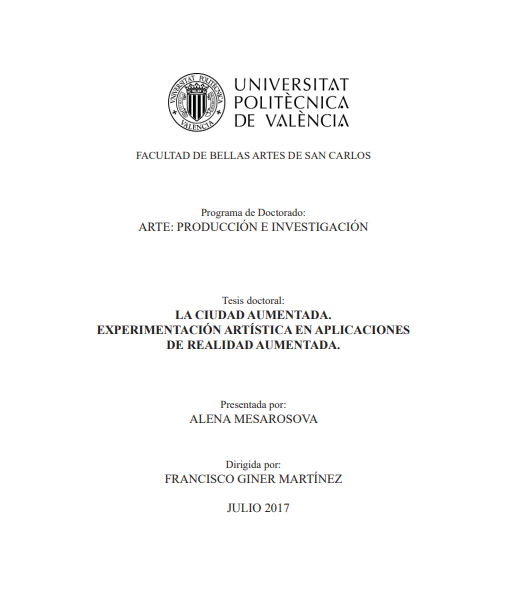La ciudad aumentada. Experimentación artística en aplicaciones de realidad aumentada
Licencia: Creative Commons (by-nc-nd)
Autor(es): Mésárošová, Alena
The hybridization of cities of the XXI. century produced by the introduction of the virtuality through the new technologies outlines changes in the scope of perception and relationship between the city and its inhabitants. The technological ubiquity is tracing a new concept of the future of contemporary cities, that enables understanding of technological factors that transform everyday life of society. The hybridization of tangible and intangible spaces, where the materiality and the virtuality fuse, gives rise to the creation of new urban spaces modalities. In the present thesis, this problematics is approached from the point of view of the Augmented Reality and how this technology is able to spread into the fi eld of architecture, urbanism and art. Furthermore, we will analyze the recent development trends of this technology in theory and practice, looking for parallelisms between technology and hybridization processes that concern actual cities. We will carry out a theoretical-practical tour that will allow us to clarify the evolution of city virtualization through digital media, the emergence of virtual communities and digital cities on the Internet. We investigate how the urban and social space is transformed by the newly acquired technological ubiquity, which breaks the boundaries of the physical space. Hybrid urban spaces, their creation and modifi cation, are portrayed by the analysis of Augmented Reality artistic interventions in the city. We enrich the theoretical research with the practical experimentation throughout a series of artistic productions that employ diff erent technological approaches to emphasize the versatility of the Augmented Reality as an artistic tool.
[Valencia: 2017]
Compartir:
Una vez que el usuario haya visto al menos un documento, este fragmento será visible.


